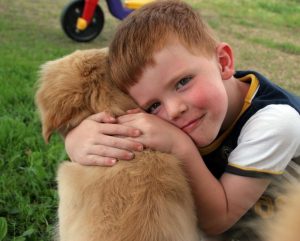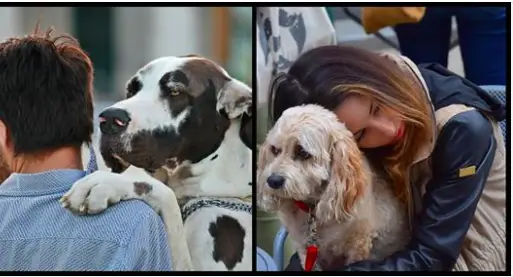Have you ever wondered how would you react if you are about to choose whose life to save, a human’s or a dog’s? This question was actually being studied and many research has been done. Even though it may seem surprising, the answer most people would give is that they would opt for the dog’s live over the human’s.
When an average person is presented with news and headlines about dogs who suffer certain tragedies and a human who suffers the same, people empathize with the dog’s suffering more. This research was conducted by the sociologists and anthropologists from Northeastern University and the University of Colorado and they are eager to find the reasons why it is like that.

The participants in the research were 256 college students who were given various faked stories about beaten humans and dogs and were asked to express their feelings and empathy for the one or the other.
Well, guess what. Most of them chose the dogs. The level of compassion towards the dogs was much higher. “We also found more empathy for victims who are human children, puppies, and fully-grown dogs than for victims who are adult humans. Age makes a difference for empathy toward human victims, but not for dog victims.”
Another similar study was conducted by a British charity which asked people to donate funds as a part of a fundraising campaign, but two different versions of the same ad were used. The text was the same on both, saying: ‘Would you give £5 to save Harrison from a slow, painful death?’ The difference was in the pictures used. One featured the real Harrison who was diagnosed with Duchenne (Muscular Dystrophy) and the other featured a dog.

At the end of the campaign, the charity donation website featuring the dog managed to attract twice as many click compared to the one depicting the boy. The actual numbers were 230, compared to 111.
If you find these results staggering then here is an explanation of why it might be like this. “It may be that many people appraise dogs as vulnerable, regardless of their age, when compared to adult humans. In other words, dogs, whether young or adult, are seen as possessing many of the same qualities associated with human babies; they are seen as unable to fully protect themselves, compared to adult humans.”
Psychotherapist Justin Lioi agrees. “We are more able to empathize with someone whom we deem to have little blame for their circumstances,” Lioi told I Love My Dog. “Dogs and babies are the definition of didn’t-ask-for-this and we are more likely to rush to support them.”
Dr. Kathrine McAleese, who is a sociologist and systemic psychotherapist, has clients who work extensively with dogs. She said she sees this phenomenon regularly. “People who fit this study’s outcomes will often view animals as innocents and humans as not having the same purity,” McAleese states. “When I ask them why they will spend money on their dog’s health, fitness, nutrition, yet not on themselves, the overwhelming answer I get is ‘because my dog deserves it.’”

McAleese adds dog trainers have told her how they struggle to have patience or empathy for the owner, yet have endless patience for the dog. “Why? The dog can’t speak up for itself, so they are the dog’s advocate,” she said.
However, those not surprised with such results are people who have close relations with animals, especially dogs, such as the certified behaviorist and animal trainer, Russel Hartstein. He believes that “dogs provide unconditional love and many times people form stronger bonds with their pet than with another human.”

Hartstein says that great number of his clients treat their dogs the same way they treat, or will treat, their children. They provide them with everything they need for the sake of having great and comfortable life. “From going to school for behavior and training, health, nutrition, wellness, enrichment and play, people form very close intimate bonds with their best friends.”
We would appreciate it if you share your thoughts on the topic in the comments section below.
Contributed by: Mary Schwager, aka, WatchdogMary , a TV and print journalist that proudly watchdogs for animals. She’s honored to have won 14 Emmy, 7 Edward R. Murrow and Associated Press awards for investigative reporting & writing.

